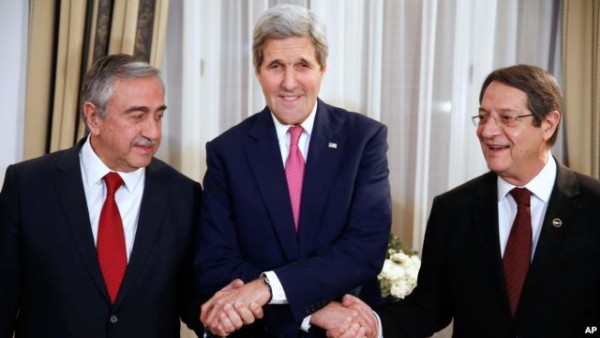
Cyprus has long had the reputation of a peace mediator’s graveyard.
But as U.S. Secretary of State John Kerry visited the divided island Thursday, there may be reason for optimism. The country’s Greek Cypriot president and the leader of the breakaway Turkish Cypriots have met 16 times since May. Both are committed to a deal, as are Greece and Turkey. And newly discovered gas deposits in the Mediterranean could mean a windfall for both if the two sides reunify.
“It’s become clear that the ground is really shifting,” Kerry, who is playing only a supporting role in the negotiations, said after meeting President Nicos Anastasiades and Turkish Cypriot leader Mustafa Akinci separately.
“Tangible progress is being made,” Kerry said. “And I am more convinced than ever that a resolution to the longstanding division of Cyprus is within reach.”
“We believe this is Cyprus’ moment,” he told reporters in the divided capital of Nicosia.
Cyprus split in 1974 when Turkey invaded the country after a Greece-backed coup. Tens of thousands fled in each direction, and the island has been divided into Greek and Turkish parts ever since. In the past four decades, would-be peacemakers from the U.S., United Nations and European Union all have attempted to end the ethnic schism. All have failed.
The plan is to create a federation of two zones with parallel systems, and Anastasiades and Akinci are supposed to meet three more times in December. Their teams are negotiating every day. Last month, Akinci said an accord was possible by mid-2016.
Areas under the recognized government’s control already are in the EU. A deal would bring the Turkish side into the bloc.
Among the thorniest issues remaining include the division of powers between the federal government and the two states, what to do about private property lost by individuals on each side and how to share the country’s economic wealth — including its offshore oil and gas resources.
The sides appear to be nearing agreements on each. Reporting progress last week, the U.N. envoy to Cyprus, Espen Barthe Eide, said leaders were confident they could resolve all outstanding issues.
Kerry, who comes with a mixed mediation record, is trying to nudge the process along. His previous successes include a resolution to last year’s election crisis in Afghanistan, though he notably failed when his nine-month peace process between Israel and the Palestinians collapsed in April 2014.
Here, however, the U.S. is not carrying the diplomatic load; the United Nations is brokering discussions.
For the U.S., strategic objectives are at stake. Peace could help stabilize the eastern Mediterranean, a region that includes unstable Lebanon, Syria and Egypt and the persistent Israeli-Palestinian conflict.
After attending a basketball game between teams of teenagers from each part of Cyprus, Kerry lauded Anastasiades and Akinci for “working really hard for peace and making the tough and creative compromises that this moment demands. They absolutely deserve our support and the support of all Cypriots.”
The top American diplomat said a lasting settlement would bring foreign investment and economic growth to a place hit hard by financial instability. He said peace could enable Cyprus to emerge as a regional energy and commercial hub. And he promised American financial aid.
Then-U.N. boss Kofi Annan thought he secured an agreement in Cyprus in 2004. When it was put to referendums, the Turkish north voted in favor. But almost three in four on the Greek side rejected the deal.
ASSOCIATED PRESS

Leave a Reply
You must be logged in to post a comment.